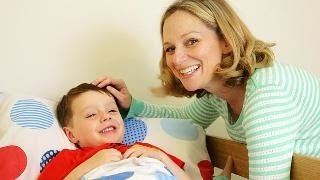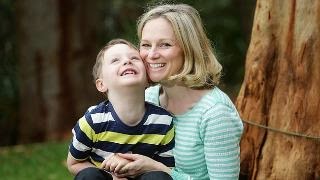Sleeping nightmare: How snoring meant my child was naughty and only surgery could help

Notes from Dr. Norman Blumenstock
My advice to parents is if you have a child who snores and whose behaviour is out-of-control, have a sleep test.
 |
| Katrina Creer with her son Mitchel, 4, battled sleep aponea for years. |
WE used to think it was a blessing our youngest child was a terrible snorer. Exhausted after a morning of meltdowns it was never a problem putting him down for his nap. And his snoring was so loud I didn’t even have to walk down the corridor to check on him.
But when he was awake, things were different. While most two-year-olds have tantrums our toddler’s were in the extreme. While other children amused themselves at the local playgroup, my son was trying to escape out the door.
SIGNS OF SLEEP APONEA
- Snoring in children with sleep aponea normally starts around two years
- It can also occur in seven to nine year olds, usually as a result of allergy or obesity
- Children tend to sleep with their neck and head stretched back
- They are fussy eaters preferring soft foods like cheese and yoghurts over hard to swallow foods
- They are often restless and sweaty sleepers
- They can be cranky during the start and end of the day, but will often appear hyperactive
- Take a video of your child sleeping and see your GP
- Other signs are blocked nose, dry lips and dark rings around eyes. They can also have a cross bite
Whenever possible, I needed someone to help me put him in his car seat as he would lie down on the floor kicking and waving his arms. This went on for two years.
Not surprisingly, there were very few offers to babysit. Friends and family didn’t always see the same loving and cuddly little boy we knew, which always reassured us there was probably nothing seriously wrong.
But by his third birthday, Mitchell barely slept through the night and his behaviour was wearing thin. Dinnertime was a struggle but by chance, one day I noticed a huge set of tonsils.
I sounded desperate but luckily our GP agreed and sent us to an Ear, Nose and Throat specialist.
While we had sought medical help before for his behaviour, we were told he would most likely outgrow it. In our sleep-deprived fog, we don’t remember anyone asking us “does your son snore?”
The specialist immediately suspected sleep aponea.
The condition causes a loss of airflow during rest often due to enlarged tonsils or adenoids.
It can also make young children naughty, despite being very tired they appear hyped-up. According to doctors, it mimics the symptoms ADHD.
The only way to make a definite diagnosis was a sleep study. The cost was covered by our private health insurance. Mitchell was wired up and eventually dosed off during our overnight stay in hospital.
 |
| Katrina Creer with her son Mitchel, 4, now enjoy a more soothing night’s sleep. |
As I lay in the same room, I could hear him noisily sucking in the air. Occasionally it would go quiet and then restart. He never fully woke and if we were at home, we would have thought it was a good night.
The test showed Mitchell had a moderate sleep aponea waking on average 26 times every hour with his oxygen levels dipping to 80 per cent. It is likely he had never been in a deep enough sleep to ever dream.
I felt relief when told the results. Over the years I’d been given plenty of parenting advice, but deep down I always felt like he just couldn’t help it.
Three months after surgery and a much calmer little boy had emerged. And now, almost a year after surgery, he has become an absolute joy.
My advice to parents is if you have a child who snores and whose behaviour is out-of-control, have their sleep checked.
For further information contact the Woolcock Institute on (02) 9114 0000 or www. woolcock.org.au




